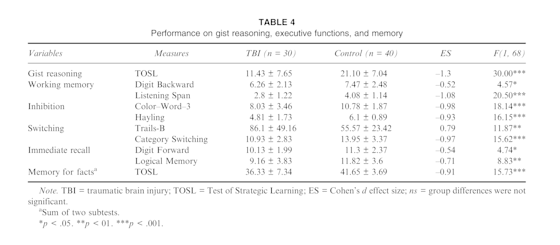Overview
Gist reasoning is the ability to abstract the core meaning from lengthy, complex information. This required ignoring the less relevant details, focusing on the important information, drawing upon our knowledge and prior experiences to construct generalized ideas. Healthy, uninjured adults are able to engage in gist reasoning easily, but little is known how those with traumatic brain injury (TBI) are able to abstract meaning from information.TBI significantly affects one's ability to manipulate information including recalling details. However, many assessments fail to test the ability to not only recall details but derive and convey deeper meanings from complex information. Using Tests of Strategic Learning (TOSL), executive function, and survey of daily life function, this paper demonstrates that individuals with a TBI had significantly lower performance in gist reasoning, but comparable education levels, IQ, reading comprehension, and speed of processing. The authors postulate that the impairments in gist reasoning could explain the lower daily life function scores reported by those with TBI.
Table 4. Performance on Gist Reasoning, Executive Functions and Memory. Note: TBI = traumatic brain injury; TOSL = Test of Strategic Learning; ES = Cohen’s d effect size; ns = group differences were not significant, and a = Sum of two subtests; *p < .05; **p < 01; ***p < .001.




